The USAID and NREL Quarterly Newsletter - March 2024
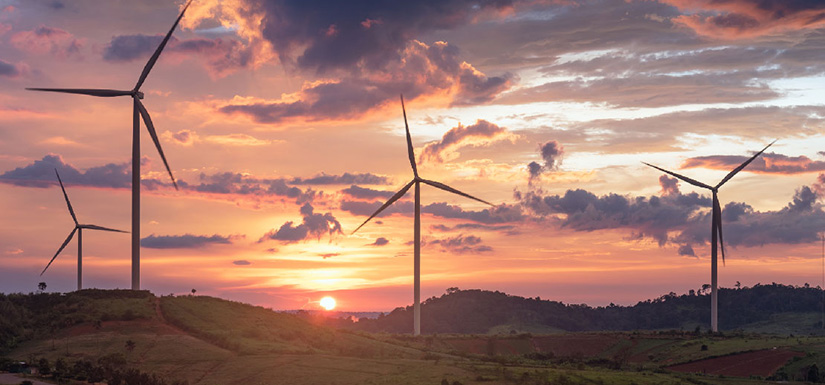
Contents
Local and Inclusive Engagement Must Be Prioritized for Successful Clean Energy Transitions
Transmission Planning With Renewable Energy Zones Can Support Bangladesh's Clean Energy Goal
Dedicated Renewable Energy Desk Supports Sri Lanka With Managing Renewable Energy Growth
Data-Driven Approaches for Smart Travel Planning and Sustainable Mobility in Laos
Women in Power System Transformation Releases Multicarrier Energy Systems Course
Tools and Training Strengthen Caribbean Islands' Cybersecurity Capabilities
USAID and Berkeley Lab Advance Energy Efficiency Standard Revision for Air Conditioners in Ecuador
Local and Inclusive Engagement Must Be Prioritized for Successful Clean Energy Transitions
I'd like to begin with an introduction. My name is Kristen Madler, and I am a clean energy coordinator in USAID's Center for Energy, Infrastructure, and Cities. I recently began directing the USAID-NREL Partnership together with Andrew Fang. I am thrilled to be in this role working closely with the U.S. Department of Energy national labs and partners around the world.
As we continue to scale USAID-NREL Partnership activities, our goal is always to ensure that results of the partnership's work produce long-lasting, positive impacts in the communities where they are based. A growing body of evidence tells us real change happens when local individuals and organizations are empowered to lead the transformation of their own societies. As explained in USAID's Local Capacity Strengthening Policy, the leadership and engagement of local actors is a key determinant in achieving just and sustainable development gains around the world. In the simplest terms, inclusion and localization are at the foundation of long-term effectiveness of development efforts.
This approach is not new to the USAID-NREL Partnership. The 2017 Greening the Grid renewable energy integration study with India involved more than 150 power system stakeholders across India. In the Philippines, the Competitive Renewable Energy Zones development process included working group members from ministries and organizations throughout the Philippines' energy sector. Local partners have always been essential to the success of USAID and NREL's collaboration. We recognize that science and technology cannot be applied in a vacuum. All our clean energy activities are fundamentally by people and for people.
To help more practitioners incorporate inclusive decision-making into their programs, a team at NREL, led by Hallie Lucas, developed a new resource that shares lessons and good practices for facilitating diverse stakeholder engagement within the context of energy transition planning. This publication draws upon the knowledge of USAID, NREL, and other U.S. Department of Energy experts with international and domestic energy planning experience. It offers practical considerations for identifying and engaging stakeholder groups and enabling participatory input throughout the planning process. I encourage you to explore the full publication: Strategies and Good Practices to Support Robust Stakeholder Engagement in Multi-Sector Energy Transition Planning.
Complementary to this publication, the USAID-NREL Partnership also offers a robust set of tools to assess the impacts of clean energy deployment that truly matter for humans—things like human health, jobs, gender, and resilience. These tools will be showcased on our website in the coming weeks for use by stakeholders around the world and to align clean energy projects with human development objectives.
As we reimagine our energy systems, we must consider how to implement change in a way that addresses societal and systemic challenges. Although this new publication may be targeted to energy planning, many of the practices it outlines can be applied to any project attempting to initiate large-scale transformation. We hope it will empower more practitioners to understand and prioritize the voices of local communities throughout their planning and decision-making. If you have thoughts or feedback on this topic, please don't hesitate to reach out at [email protected]. Thank you.
Featured Video
In celebration of Women's History Month, hear from the 2023 Women in Power System Transformation interns and fellows about how participating in this initiative not only helped them to develop new skills but inspired them to lift their voices and be catalysts for change.
Featured News
High-Resolution Renewable Energy Data Levels the Playing Field for Eastern Europe, Africa, and the Arabian Peninsula
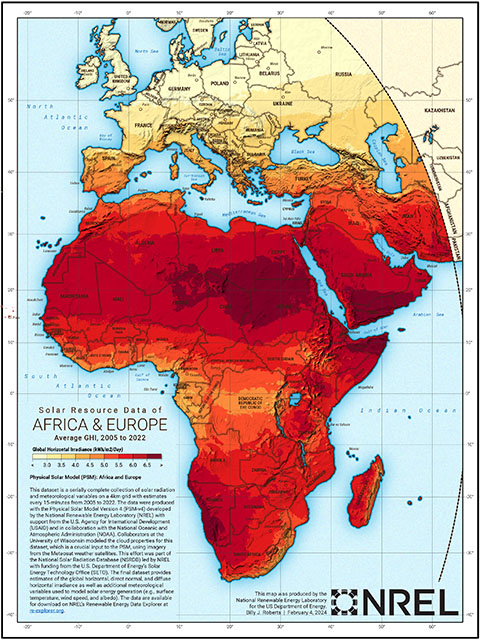
High spatial and temporal resolution solar data for all of Europe, Africa, and the Arabian Peninsula available on RE Data Explorer. Map by Billy Roberts, NREL
At a crucial time in the energy transition, a long-term, time series solar data set is publicly available for all of Eastern Europe, Africa, and the Arabian Peninsula, painting a high-resolution picture of renewable energy potential. Funded by a pair of USAID Missions in Ukraine and Tanzania, the data cover an 18-year historical record. Maps and the complete data set are on RE Data Explorer, where they can be viewed and downloaded for free to support grid planning, project development, and policymaking. This data set supports more effective incorporation of clean energy in countries where detailed information on renewables has been historically difficult and costly to access.
"This is a big deal to have a public data set that we can trust for Africa; it's going to be a game changer," said NREL's Tanzania mission technical lead Kwami Sedzro. In Ukraine, the data set will be critical to enable planners and developers to incorporate more renewable energy as the country rebuilds its grid and searches for new means to become less dependent on foreign resources. Read the full story and check out the new high-fidelity solar data: Game-Changing High-Resolution Solar Data Enables Renewable Energy Expansion Across 2 Continents.
Standards Guidance Makes Safe and Reliable Adoption of Electric Two- and Three-Wheelers in Pakistan Possible
Pakistan has embraced electric two-wheelers (E2Ws) and electric three-wheelers (E3Ws) in its National Electric Vehicle Policy and is targeting 50% of new two- and three-wheeler sales to be electric by 2030. In the short term, this policy targets five times as many E2Ws and E3Ws as cars, vans, and pickups. To meet these goals in a safe, reliable, and efficient manner, Pakistan needs to develop and implement standards related to E2W and E3W vehicles and charging infrastructure, including battery swap stations. Fortunately, there are several global and local efforts to establish standards that Pakistan can learn from or adopt.
The USAID-NREL Partnership published a report that explains the purpose and process of standards development and introduces the international standards development organizations involved and relevant classification and testing systems. It also introduces and lists many standards related to the vehicles, batteries, and charging equipment so that Pakistan can adopt or reference these standards when developing its own. By establishing and implementing these standards, Pakistan can facilitate the widespread adoption of E2Ws and E3Ws and contribute to cleaner air and reduced emissions. Learn more by exploring the full report: Standards Guidance for Electric Two- and Three- Wheelers and Charging Infrastructure in Pakistan.
Transmission Planning With Renewable Energy Zones Can Support Bangladesh's Clean Energy Goal
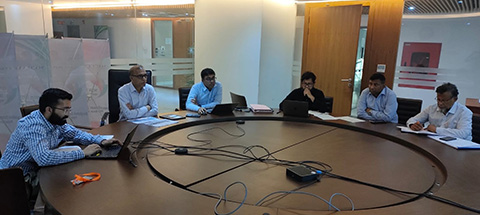
Prateek Joshi (far left), NREL, shares the data and results with the members of the Bangaldesh Economic Zones Authority. Photo by Prateek Joshi, NREL
Bangladesh is working to achieve 40% of the country's electricity generation from clean energy by 2041. However, land availability, transmission congestion, and growing electricity demand are challenges Bangladesh must address to reach its renewable energy objectives. To help overcome these barriers, USAID and NREL, through the Reinforcing Advanced Energy Systems program, conducted analysis focused on identifying potential candidates for Renewable Energy Zones, or geographic areas with high concentrations of cost-effective renewable energy, in the country.
The analysis leverages high-quality renewable energy resource data for Bangladesh developed through previous USAID-supported work at NREL. It identifies candidates for site-specific assessments so that wind and solar power can be more easily incorporated into other long-term energy sector planning efforts in Bangladesh. USAID and NREL shared these findings and data with the Bangladesh Economic Zones Authority during stakeholder meetings in March 2024, so that the Bangladesh Economic Zones Authority can use this data to prioritize renewable energy investments in its economic development zones. With the findings and data from this study, other policymakers and researchers can also take the next steps to bolster renewable energy development in Bangladesh. Explore these findings: Identifying Potential Candidates for Renewable Energy Zones in Bangladesh.
Dedicated Renewable Energy Desk Supports Sri Lanka With Managing Renewable Energy Growth
Sri Lanka's energy goals include deriving 70% of electricity from clean sources by 2030. To meet this target, the Ceylon Electricity Board (CEB) collaborated with NREL, through the South Asia Group for Energy program, to conduct an analysis of the country's current power system and identify operational and technical gaps that could hinder the integration of renewable energy. NREL outlined these findings and provided recommendations for CEB to address these gaps, with a key recommendation being the establishment of a dedicated renewable energy desk within CEB to manage variable renewable energy operation.
This desk would focus on monitoring, predicting, and managing energy influx from renewable sources, as well as coordinating with other sections of CEB's control room. By implementing NREL's recommendations for establishing a dedicated renewable energy desk and modernizing grid operating and planning practices, CEB can enhance its capacity to integrate renewable energy into the grid while maintaining reliability, which can support Sri Lanka with advancing its transition to a more sustainable and modern electric grid system. Learn more about implementing a renewable energy desk for system operations: An Overview of Renewable Energy Desk Activities for Power Grid Operations and Planning.
Data-Driven Approaches for Smart Travel Planning and Sustainable Mobility in Laos
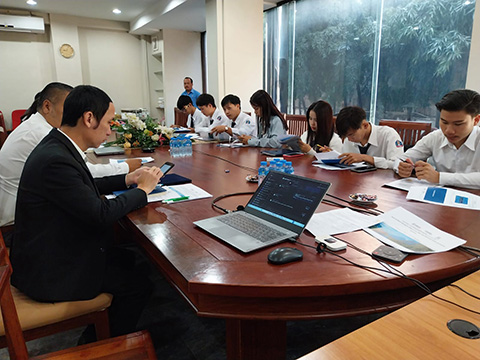
Training participants in Laos download the NREL's OpenPATH app. Photo from Siphachanh Thythavy
Laos is pursuing strategies to achieve ambitious electric vehicle deployment goals, aligning with its economic and energy security objectives. However, it lacks the right data to inform sustainable and inclusive transportation and electric vehicle planning.
To address this need, NREL developed a Laos-specific version of Open Platform for Agile Trip Heuristics (OpenPATH), an app-based tool that collects transparent and accessible travel data and analysis. As part of the tool's rollout, USAID and NREL's Advanced Energy Partnership for Asia team collaborated with the Laos Ministry of Energy and Mines to host a workshop on understanding the need for gender-disaggregated data and the potential of OpenPATH. The use of this open-source tool can empower Laos stakeholders to collect and understand their own travel data while achieving place-based, locally relevant sustainable mobility goals.
Women in Power System Transformation Releases Multicarrier Energy Systems Course
With support from the Women in Power System Transformation program, a university-level technical course about "Multicarrier Energy Systems," led by Madeleine McPherson, is now available. This course explores the emergence and role of multicarrier energy systems in the energy transition and aims to instill a holistic perspective on the highly interconnected nature of energy challenges and the shift toward net zero. It outlines key themes of decarbonization and electrification, delves into modeling techniques, and concludes by assessing existing tools and paradigm shifts in energy systems modeling. The course also includes a practical exercise using the Scenario Explorer model for deeper understanding. Materials for this and other course topics are available to anyone at no cost. They consist of approximately 3–5 hours of recorded lectures, supporting lecture slides, and student exercises and assessments. Access the course materials.
Tools and Training Strengthen Caribbean Islands' Cybersecurity Capabilities
Power sector utilities in Latin America and the Caribbean can face cybersecurity challenges ranging from ransomware attacks to implementing appropriate awareness and training programs. In November 2023, the USAID-NREL Partnership joined the launch event for the Caribbean Renewable Energy Community's Cybersecurity working group, which is spearheaded by the Caribbean Electric Utility Services Corp. NREL cybersecurity expert Anuj Sanghvi presented on NREL's cybersecurity capabilities and highlighted the collaboration with USAID's Strengthening Utilities and Promoting Energy Reform program in Latin America and the Caribbean. The launch of Caribbean Electric Utility Services Corp.'s new working group will ensure knowledge-sharing and can expand the impact of NREL's training, open-source tools, and cybersecurity analysis capabilities in the region.
In addition to support for the working group, the USAID-NREL Partnership has completed several cybersecurity assessments with regional utilities using NREL's Distributed Energy Resource Cybersecurity Framework (DER-CF) tool. Over the past couple years, cybersecurity experts from NREL and USAID's Strengthening Utilities and Promoting Energy Reform program have facilitated in-depth assessment sessions with utility staff in the areas of cybersecurity governance, technical management, and physical security. Completing the DER-CF assessment and working with the USAID-NREL Partnership to understand their results allows regional utilities to gain valuable insights into their cybersecurity strengths and weaknesses, readying their teams to enhance internal measures, address future vulnerabilities, and increase overall preparedness.
Learn more about NREL's cybersecurity capabilities for international applications.
USAID and Berkeley Lab Advance Energy Efficiency Standard Revision for Air Conditioners in Ecuador
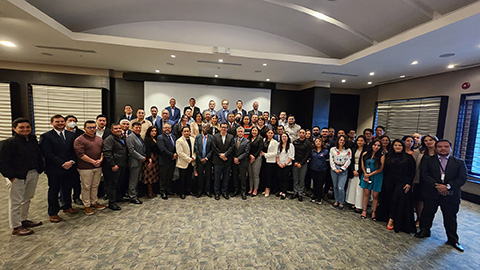
Participants at the "Cooling Summit," held in Quito in November 2023, organized by USAID, Berkeley Lab, and Ecuador's Ministry of Production, Foreign Trade, Investment and Fisheries. Photo from Alberto Diaz-Gonzalez, Berkeley Lab
An update of the current minimum energy performance standard for air conditioners in Ecuador could achieve an avoidance of generation capacity of 240 MW by 2035 and 460 MW by 2045, according to a report developed by Berkeley Lab with support of USAID's Energy Efficiency for Development program (EE4D). The results of the analysis were presented at a "Cooling Summit" event held in Quito on Nov. 15, 2023, organized by USAID, Berkeley Lab, and Ecuador's Ministry of Production, Foreign Trade, Investment and Fisheries and attended by representatives of government agencies, HVAC industry, and the cooling research community.
The report provides a technical assessment supporting the revision and update of the minimum energy performance standard for air conditioners in Ecuador, which was set in 2013. The methodology used in the report includes the scenario analysis of five minimum energy performance standard levels, the estimation of the current AC ownership rate, and the projection of the AC stock in Ecuador to 2050. In the context of the electricity crisis caused by the reduction of hydropower during the dry season, the technical assistance provided by EE4D advances energy efficiency as part of the strategy to reduce the vulnerability of the power sector in Ecuador. Learn more at EE4D.
Tools and Resources for Real World Problem-Solving
![]() We love learning how our tools and resources provide solutions to people, organizations, and even governments around the world. Our team recently spoke with Le Quang Huy, the head of the Technical and International Cooperation Department at Power Engineering Consulting Joint Stock Company 1. Huy shared how Vietnam is looking to develop feasible offshore wind projects as well as improve its planning and investment decisions. Huy used the open-source RE Data Explorer to estimate the cost and operational expenditures for a potential offshore wind site. Huy noted that the tool saved him a lot of time and provided valuable insights into technical-specific considerations for wind turbines. This use of RE Data Explorer exemplifies its crucial role in supplementing critical data gaps for offshore wind projects, enabling better estimation and decision-making processes for users.
We love learning how our tools and resources provide solutions to people, organizations, and even governments around the world. Our team recently spoke with Le Quang Huy, the head of the Technical and International Cooperation Department at Power Engineering Consulting Joint Stock Company 1. Huy shared how Vietnam is looking to develop feasible offshore wind projects as well as improve its planning and investment decisions. Huy used the open-source RE Data Explorer to estimate the cost and operational expenditures for a potential offshore wind site. Huy noted that the tool saved him a lot of time and provided valuable insights into technical-specific considerations for wind turbines. This use of RE Data Explorer exemplifies its crucial role in supplementing critical data gaps for offshore wind projects, enabling better estimation and decision-making processes for users.
Resource Round-Up
Find all the publications, events, and resources outlined in this newsletter at a glance.
Must-Reads
From ClimateLinks: Levers for Mobilizing Climate Finance for Clean Energy in USAID Activities
An Overview of Renewable Energy Desk Activities for Power Grid Operations and Planning
Standards Guidance for Electric Two- and Three-Wheelers and Charging Infrastructure in Pakistan
Identifying Potential Candidates for Renewable Energy Zones in Bangladesh
Must Watch
Free Trainings
Hydrogen 101: The multi-part Hydrogen and Analytical Tools Workshop Series, presented by the Clean Energy Solutions Center, examines the potential benefits and tradeoffs of hydrogen development and the key factors to consider when making strategy, policy, and investment decisions about the future of hydrogen and its derivatives. The first installment, Hydrogen 101, introduces the series at-large, outlines the fundamentals of hydrogen, and explores the "Hydrogen Considerations Tree," a resource designed to empower institutions to navigate decision-making related to hydrogen development. The Hydrogen Considerations Tree was created through the USAID-NREL Partnership.


